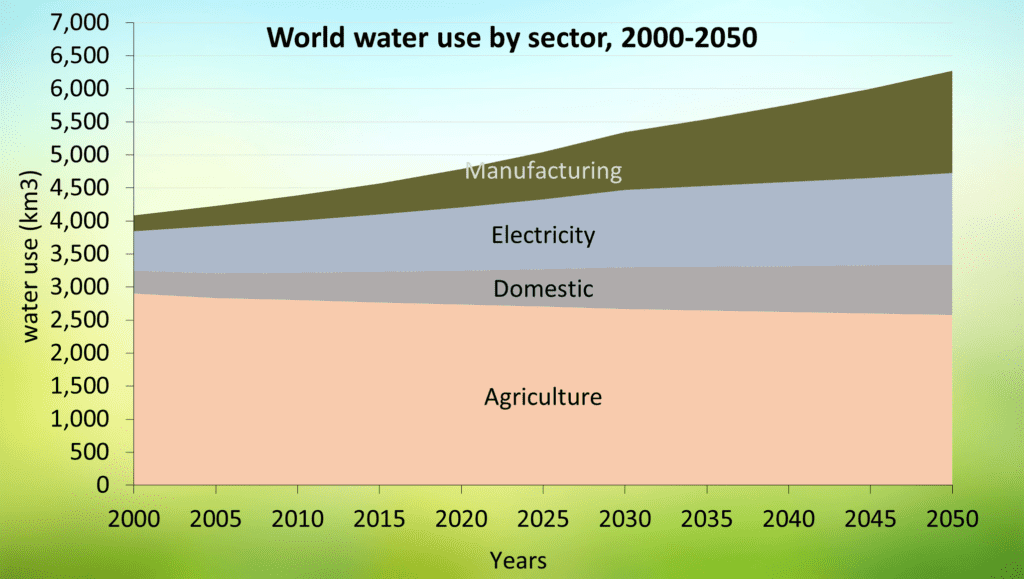Water is essential for life. No one can survive without water as it is critical for the cellular function of living organisms, there is no life without water. Human beings can survive three weeks without food, but only three days without water. Water is not only used for survival, but also for various important purposes such as the source of drinking water, recreational purposes, support for aquatic animals and ecosystems, and agricultural uses
Agriculture is the foundation of our economy and water is a critical input for Agriculture and Food Production. Water is primarily used for irrigation, and the application of Pesticides, and fertilizers which is an important step in the process of Food Production. According to the International Water Management Institute, Agriculture accounts for about 70% of global water withdrawals. Due to Population growth, it is constantly competing with domestic, industrial, and environmental uses for a scarce water supply. Water demand is rising rapidly and challenging food availability at the global level. Water is the base for a developed economy as it is the resource used in almost every sector of the economy

According to a new United Nations report The current world population of 7.6 billion is expected to reach 8.6 billion in 2030, 9.8 billion in 2050, and 11.2 billion in 2100, This population will need more food to survive which estimates that agricultural production will need to expand by approximately 70% by 2050 which needs more water. Nowadays, Water scarcity is the biggest problem in the economy and Water management is an essential step to take for managing the problem of scarcity. Water waste should be reduced to overcome the problem of the water crisis as food production is dependent on farming, which may result in a hike in food prices for consumers. Farmers are greatly affected by the water crisis as irrigation is a top concern for them to produce food. Bad weather conditions, global warming, and drought are farmers’ main drivers of water scarcity. Water is a precious resource and cannot be alternated.
According to FAO, It takes 1-3 tonnes of water to grow 1 Kg of Cereal and Between 2000-5000 Litres of water are needed to meet the daily food requirement of a person. Fresh water is the topmost concern in meeting this requirement. The world contains an estimated 1400 million cubic km of water but only 0.003% of this amount includes Freshwater which could be used for drinking, hygiene, agriculture, and industry. But not all the water is accessible because part of it flows into remote rivers during seasonal floods which gives birth to the problem of water scarcity as the Water supply is insufficient to meet the water demand.
Climate change is also a critical reason for intense water demand Higher temperatures, evaporation rates, and variable Rainfall could increase the demand for water in near future. Several Drought and Flood conditions are also the cause of Climate change. Climate Scientist Predicts that heavy and intense rainfall will lead to more floods while more water in the soil can make the soil quality bad and Runoffs into nearby waterways can pick up containments like fertilizers and pesticides Excess Runoffs leads to Rapid growth of algae which is harmful to the aquatic ecosystem and limits water access of the water to the human beings and makes the water unfit for Irrigation as well.
Global warming can be counted as the most critical reason for the water crisis. An increase in the Global temperature heightens water stress. According to UN Experts, an increase of 1°C caused by global warming results in a 20 percent reduction in Renewable Water resources. The Agricultural sector faces many challenges and Farmers are suffering from unpredictable rainfalls, High temperatures cause the evaporation of water from the soil.
The Danger is real because Water has no substitute, and this is the primary Input in Agriculture and Food production. Meanwhile, Several Government approved projects examining how water can be allocated to prevent shortages and Increase the Water storage system. There are also a few things we can do to conserve water such as avoiding food that requires more water to produce, Prohibiting water waste in Indoor, Outdoor, and Industrial use.
